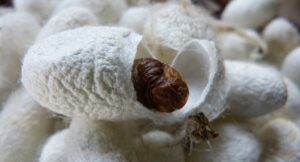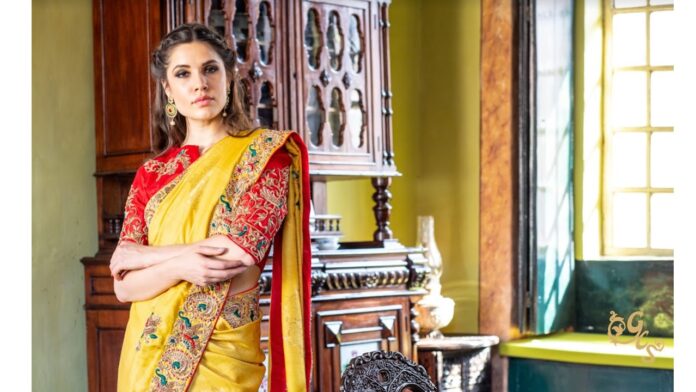In India, the post October nip in the air brings with it the much-awaited wedding season. In spite of Covid, weddings continue to be solemnised, and markets are flooded with families who are shopping for the wedding of their near and dear ones. With options galore, ladies wanting to put their best foot forward do not restrain themselves from going for the best, even if it means shelling out some extra money. Ethnic wear witnesses the largest growth in demand during this time, especially silk sarees, embroidered and embellished sarees, and also other dress types including lehengas and kurtis.
One of the most sought-after fabrics during this period is silk as it represents elegance, style, prestige and beauty. Silk is one of the oldest and most expensive fibres that has managed to stay relevant for over 4000 years. The rearing of silkworms first began in China, which used to trade its silk with Europe and the Middle East using the Silk Road. Even today, it continues to be a fabric of choice for women, and even men, in several parts of the world. Vegans, however, do not wear silk. Let us understand why.
Silk Extraction Means Massacre of Innocents
The process of silk extraction involves a lot of cruelty and that is one reason vegans as well as people looking for cruelty-free options do not buy clothes made out of this fabric. Silk is obtained from silkworms using a process known as sericulture. Silkworms secrete a protein from their salivary glands in order to weave a protective cocoon. During this time, the silkworms are in pupa stage, and this is when silk is obtained by boiling of pupae alive so that it becomes easier to unwind the silk thread. For one meter of silk fabric, 3,000 to 15,000 silkworms are boiled alive!



Various studies have shown that worms feel sensations, produce endorphins and also have a physical response to pain. Silk obtained from this method is therefore neither vegan nor cruelty-free.
What Are The Options Then?
Luckily, there are several vegan alternatives available for silk such as milkweed fibres, silk cotton tree fibre, banana fibre, amongst others. Ahimsa silk has also become very popular amongst conscious customers as it involves extraction of fabric without killing silkworms. The method was developed by Kusuma Rajaiah, a leading handloom technologist. Ahimsa silk is not technically vegan but is a form of cruelty-free silk. However, the claims of it being cruelty-free are also not completely verifiable. Then, there are synthetic materials such as viscose or rayon, and other manmade yarns, which have been improvised over the years to provide a finish and sheen similar to that of silk.
For the ongoing wedding season in India, several ethnic wear brands are catering to customers with their unique collections of vegan sarees, lehengas, kurtis, dresses, amongst others.
Here we have listed some of the most popular brands that offer vegan sarees:
Ghatkopar Cloth Store
Ghatkopar Cloth Store is a well known name when it comes to vegan sarees. Established in 1958, the store took a strategic decision to completely shift to vegan silk in 2006 after its owners understood the gross cruelty that takes place in the process of silk extraction. In 2011, their saris received certification by PETA, and they have also been conferred the ‘Best Vegan Sarees Award’ by the animal rights organisation last month.



Their Anukampa Collection is a range of exquisite saris made from vegan silk. Other offerings include sarees, lehengas, Indo-western dresses – all made from vegan silk.
Bharat Mehta of Ghatkopar Cloth Store told The Vegan Indians, “We have seen a remarkable growth in the sale of vegan sarees over the last few years. Our sarees offer a quality and vibrancy similar to that of pure silk. Another benefit that customers get is the lower price range as compared to regular silk sarees. So it’s a win-win!”



“We started selling vegan sarees in 2006, and since then, our R&D team has worked tirelessly to improvise the fabric in order to make it at par with pure silk. We still keep innovating in both our quality and designs so that customers can get something new everytime they come to our store,” added Bharat.
Ghatkopar Cloth Store sarees are available through their retail store in Mumbai, and also via their website.
Shubam Sarees
Coimbatore-based brand Shubam Sarees has carved a niche for itself in vegan sarees segment. They offer sarees made out of rayon and cotton, but with the same look and feel as that of pure silk. They keep evolving their collections every few weeks, and offer sarees at pocket-friendly prices. One may buy their sarees online via their social media pages or through WhatsApp.
Anshi Aadaiyagam



Started by two friends Naga Deepa and Chitra in July this year, Anshi Aadaiyagam stocks a brilliant collection of vegan handloom sarees. These sarees are made of plant-based fibre, mixed with acrylic and rayon to give it a complete silk-like feel. These sarees are absolutely soft and lightweight.
Deepa told us that the brand’s main motive is to source weaves from artisans working in rural areas and offer best quality material to their customers. She said, “Despite being new in this business, we are getting good enquiries from customers. People are inquisitive about vegan sarees. We are currently selling through our Instagram page and have also started a WhatsApp.”



Besides vegan silk, one can also buy other weaves from Anshi Aadaiyagam.
Shobitam Sarees
For those willing to look overseas for their vegan ethnic wear, there is Shobitam. Founded by sisters Aparna and Ambika in Seattle, Shobitam sarees are made from the fibre obtained from the bark of the banana tree. They work closely with weavers across India in designing unique collections and aim to popularise lesser known and unique weaves. One may buy their sarees through their online platform.



